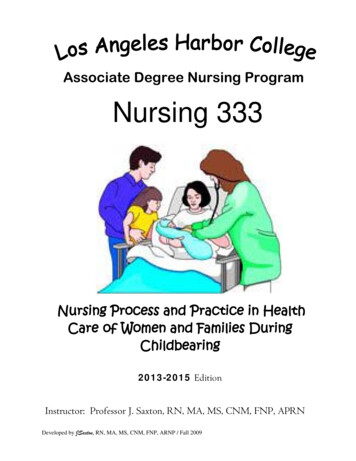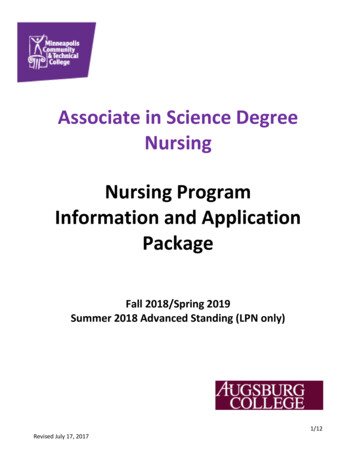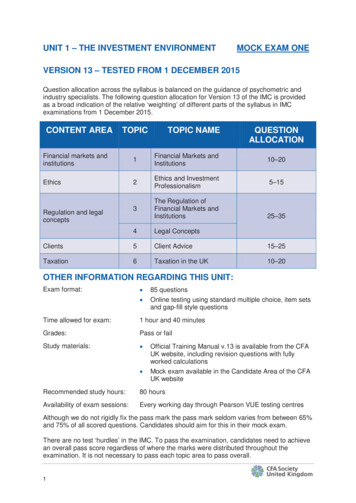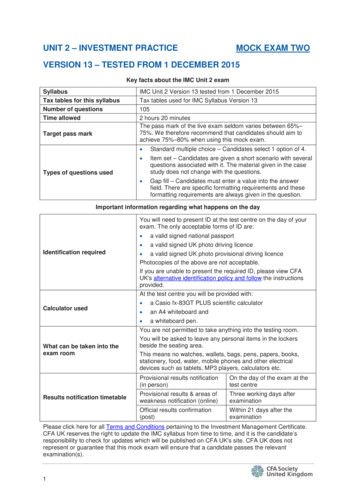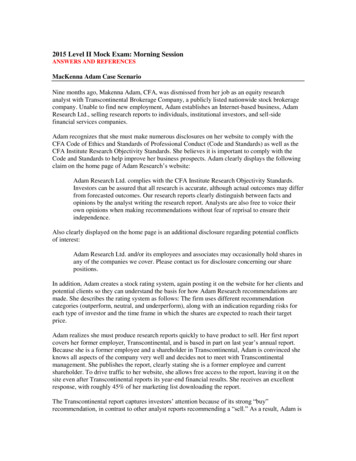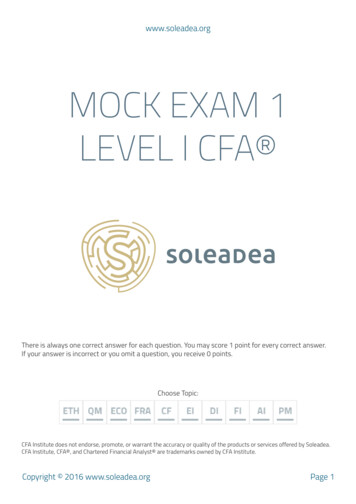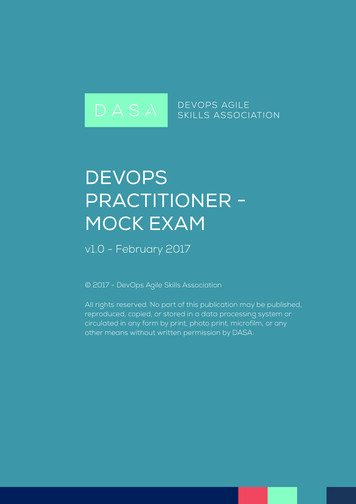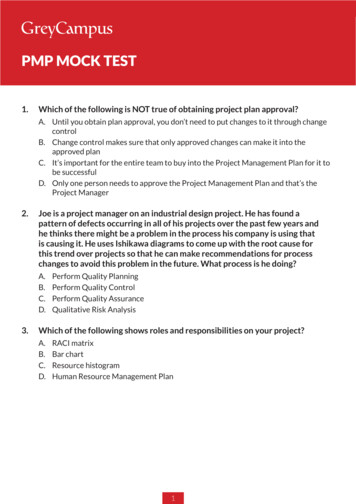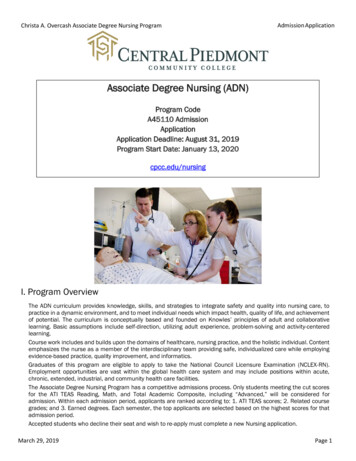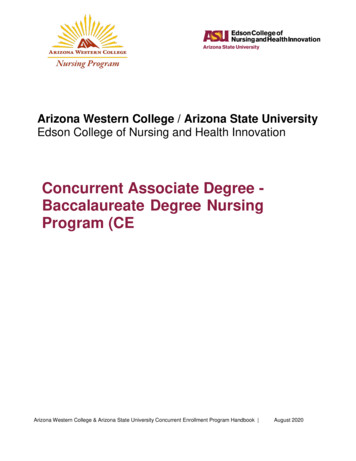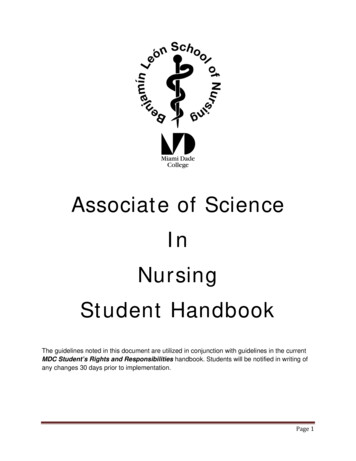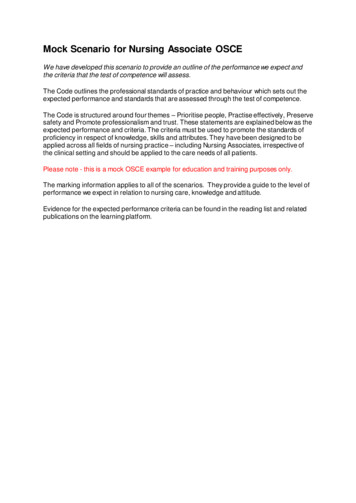
Transcription
Mock Scenario for Nursing Associate OSCEWe have developed this scenario to provide an outline of the performance we expect andthe criteria that the test of competence will assess.The Code outlines the professional standards of practice and behaviour which sets out theexpected performance and standards that are assessed through the test of competence.The Code is structured around four themes – Prioritise people, Practise effectively, Preservesafety and Promote professionalism and trust. These statements are explained below as theexpected performance and criteria. The criteria must be used to promote the standards ofproficiency in respect of knowledge, skills and attributes. They have been designed to beapplied across all fields of nursing practice – including Nursing Associates, irrespective ofthe clinical setting and should be applied to the care needs of all patients.Please note - this is a mock OSCE example for education and training purposes only.The marking information applies to all of the scenarios. They provide a guide to the level ofperformance we expect in relation to nursing care, knowledge and attitude.Evidence for the expected performance criteria can be found in the reading list and relatedpublications on the learning platform.
Theme from the CodePromote professionalismPrioritise peopleInfection prevention andcontrolCare, compassion andcommunicationPractice effectivelyOrganisational aspects ofcare specific to specificskillsDocumentationExpected Performance and CriteriaBehaves in a professional manner respecting others and adopting nondiscriminatory behaviour. Demonstrates professionalism through practice.Upholds the patient’s dignity and privacy.Introduces self to the patient at every contact.Actively listens to the patients and provides information and clarity.Treats each patient as an individual showing compassion and care duringall interactions. Displays compassion, empathy and concern. Takes aninterest in the patient.Respects and upholds people’s human rights. Upholds respect by valuingthe patient’s opinions and being sensitive to feelings and/or appreciatingany differences in culture.Checks that patient is comfortable, respecting the patient’s dignity andprivacy.Adopts infection control procedures to prevent healthcare-associatedInfections at every patient contact.Applies appropriate Personal Protective Equipment (PPE) as indicated bythe nursing procedure in accordance with the guidelines to preventhealthcare associated infections.Disposes of waste correctly and safely.Seeks patient’s permission/consent to carry out observations/proceduresat every patient contact.Checks patient identity correctly both verbally, and/or with identificationbracelet and the respective documentation at every patient contact.Uses a range of verbal and non-verbal communication methods. Displaysgood verbal communication skills by appropriate language use, somelistening skills, paraphrasing, and appropriate use of tone, volume andinflection. Good non-verbal communication including elements relating toposition (height and patient distance), eye contact and appropriate touch ifnecessary.Maintains the knowledge and skills needed for safe and effective practicein all areas of clinical practice.Ensures people’s physical, social and psychological needs are assessed.Completes physiological observations accurately and safely for therequired time using the correct technique and equipment.Ensures any information or advice given is evidence based including usingany healthcare products or services.Documents all nursing procedures accurately and in full, includingsignature, date and time.Writes clearly so that it can be easily read by others.Records the date, month and year of all observations.Charts all observations accurately.Scores out all errors with a single line. Additions are dated, timed andsigned.Writes the record in ink.Preserve safetyMedicine managementAdministers medicines within the limits of training, competence, the law,the NMC and other relevant policies, guidance and regulations.
The Mock OSCE scenario part is made up of three stations: Ongoing Assessment,Implementing Care and Ongoing Care. The instructions and available resources areprovided for each station, along with the specific timing.ScenarioAlice Sharman has attended her General Practitioner (GP) appointment today with a historyof feeling ‘poorly’ for the past 2 days. She is not eating and feels very tired. Alice also has aheadache. She has pain and frequency of micturitionYou will be asked to complete the following activities to provide hig h quality, individualisedcare for the patient.StationYou will be given the following resourcesOngoing Assessment – 15 minutesYou will collect, organise and documentinformation about the patient. Implementing Care – 15 minutes You will administer medications in thisstationOngoing Care – 15 minutes You will document the care that hasbeen provided using an SBAR tool –(Situation, Background, Assessment andRecommendation) so that this iscommunicated with other healthcareprofessionals.A Patient Record document from the GPAssessment overview and documentationwhich you will be asked to completeObservations chartAn overview and Medication AdministrationRecord (MAR)An overview and Ongoing Care letter for theperson you have been caring forMarkingYou will be marked against 4 domains in each station 1. Interpersonal skills2. Provide and monitor safe and effective care3. Professional behaviour4. DocumentationAs well as these domains you will be given a global overall result of excellent, good,borderline, fail or unsafe practiceExample Documentation for Nursing Associate ScenarioBelow is an example of an OSCE which is based in the community setting. Other scenarioswill be based in a variety of care settings including Hospital based care. The OSCE coversall ages from children to care of the older person. As well as a scenario element there willalso be clinical skills that you need to complete to achieve an overall pass in the OSCE.Documentation include below –1. General Practitioners Person Information form2. Ongoing Assessment3. Implementing Care – medication documentation4. Ongoing Care
Ashwood Medical CentreGreen StreetNN1 7ALPatient RecordsPatient DetailsNameAddressDate of BirthNHS numberContact numberGeneral Practitioner (GP)Family HistoryMotherFatherSiblingsContactAlice Sharman1 Sweet St, Northampton, NN1 7AL10.10.19908765432107123456789Dr. AlbanyEleanor SharmanAli SharmanAli Sharman – brotherEllie Sharman – sister07987654321 - motherPast Medical HistoryMild learning disabilities following meningitis at 4 days old due to maternalGroup B Streptococcus infection.Asthma as a child – not on any current treatmentHayfeverFor the past week, Alice has complained of headaches and has had regularblood pressure monitoring – her blood pressure has ranged from 160/100 to170/110AllergiesPeanuts – carries an EpiPen
MedicationsCetirizine hydrochloride 10mgs once a day for hayfeverEpiPen – for allergic reactionSocialAlice lives in independent supported housing. She currently attends the localcollege and is studying Catering. Alice has a part time job in a charity shopone day a week. She has regular contact with her family who are supportiveand involved in her health and social care needs. Alice has a carer who helpsher maintain her independence in her flat.TodayAlice attended a GP appointment today accompanied by her Carer. HousingManager is aware of the GP appointment. Social Worker to be informed ifneeded. Alice will call parents later.For the last 2 days she has felt ‘poorly’, not eating, feeling very tired and hasa headache. She is also complaining of frequency and painful micturition.Normal bowel movement – once a day.Diet – feeling nauseous, tolerating fluids.Last menstrual period – 1 week ago.Not currently taking any medicationReferral for Review by Practice Nursing Associate –Complete temperature, pulse, respirations and blood pressure.UrinalysisDiscuss some activities of living as these need to be reviewed
Ongoing AssessmentCandidate nameAlice Sharman has attended her GP appointment today with a history of feeling ‘poorly’ forthe past 2 days. She is not eating and feels very tired. Alice also has a headache. She haspain and frequency of micturition.You have been asked to complete temperature, pulse, respirations and blood pressure. Youalso need to undertake a urinalysis.The GP would also like a review of Alice’s Activities of Living to be completedYou need to briefly discuss the following Maintaining a safe environmentBreathingNutrition and hydrationSleepingAssume it is today and it is 10:30a.m.Alice Sharman has just arrived.This documentation forms part of your exam and is marked by theExaminers
Activities of LivingMaintain a safe environmentBreathingNutrition and hydrationSleeping
Ongoing CareCandidatesName:Note to Candidate: This document must be complete using a BLUE PEN At this station, you should have access to your Ongoing Assessmentand Implementing Care documentationo Please Note: there are 3 pages to this document Document to NMC standardsThe examiner will retain all documentation at the end of the stationAlice Sharman attended her General Practitioner (GP) today complaining of feelinggenerally unwell, headache and frequency and pain on micturition. For the pastweek Alice has had her blood pressure monitored as it has been raised.You completed a set of observations and a urinalysis. Along with updating areview of activities of living with Alice.Following this appointment Alice had – A midstream specimen of urine sent for culture and sensitivity whichshowed a urinary tract infection - antibiotics were prescribed Antihypertensive medication has been prescribed and regular bloodpressure monitoring plannedYou need to complete the Ongoing Care document to update Alice’s records. Youwill also be required to provide a verbal handover to the District Nurse to ensurethey have a full an accurate account of Alice’s recent history, monitoring and careneedsEnsure you complete all sections of the Ongoing Care document
Ongoing CareAlice SharmanNHS Number: 87654321Date of Birth: 10.10.19901 Sweet Street, Northampton NN2 7ALComplete each section In FullClearly identify the initial reason for GP appointment Confirmed Diagnosis Date of tions
Document allergies and associated reactionsIdentified areas of self-careIdentified potential areas for health promotion:Other members of the multidisciplinary team who need to beaware of the ongoing care needs for this patientPRINT NAMESignatureDate
the clinical setting and should be applied to the care needs of all patients. Please note - this is a mock OSCE example for education and training purposes only. The marking information applies to all of the scenarios. They provide a guide to the level of performance we expect in relation to nursing care, knowledge and attitude. Evidence for the expected performance criteria can be found in .
